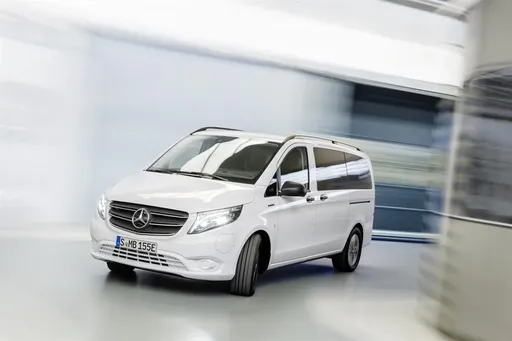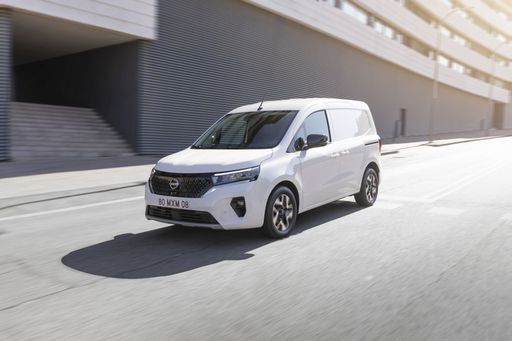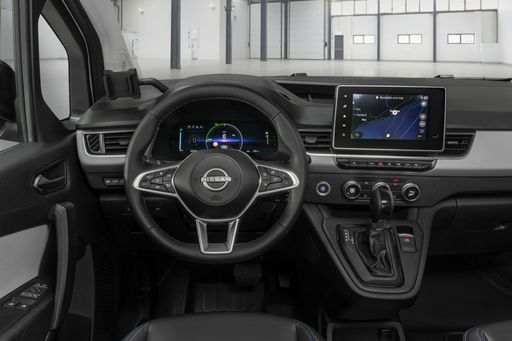Mercedes Vito Bus vs Nissan Townstar Compact Van - Differences and prices compared
Compare performance (237 HP vs 130 HP), boot space and price (36300 £ vs 24200 £ ) at a glance. Find out which car is the better choice for you – Mercedes Vito Bus or Nissan Townstar Compact Van?
Costs and Efficiency:
When it comes to price and running costs, the biggest differences usually appear. This is often where you see which car fits your budget better in the long run.
Nissan Townstar Compact Van has a significantly advantage in terms of price – it starts at 24200 £ , while the Mercedes Vito Bus costs 36300 £ . That’s a price difference of around 12115 £.
Fuel consumption also shows a difference: Nissan Townstar Compact Van manages with 6.60 L and is therefore barely noticeable more efficient than the Mercedes Vito Bus with 6.70 L. The difference is about 0.10 L per 100 km.
In terms of energy consumption, the advantage goes to the Nissan Townstar Compact Van: with 18.50 kWh per 100 km, it’s convincingly more efficient than the Mercedes Vito Bus with 26.70 kWh. That’s a difference of about 8.20 kWh.
As for electric range, the Mercedes Vito Bus performs clearly perceptible better – achieving up to 370 km, about 81 km more than the Nissan Townstar Compact Van.
Engine and Performance:
Power, torque and acceleration say a lot about how a car feels on the road. This is where you see which model delivers more driving dynamics.
When it comes to engine power, the Mercedes Vito Bus has a convincingly edge – offering 237 HP compared to 130 HP. That’s roughly 107 HP more horsepower.
In terms of top speed, the Nissan Townstar Compact Van performs clearly perceptible better – reaching 183 km/h, while the Mercedes Vito Bus tops out at 140 km/h. The difference is around 43 km/h.
There’s also a difference in torque: Mercedes Vito Bus pulls clearly stronger with 500 Nm compared to 245 Nm. That’s about 255 Nm difference.
Space and Everyday Use:
Beyond pure performance, interior space and usability matter most in daily life. This is where you see which car is more practical and versatile.
Seats: Mercedes Vito Bus offers distinct more seating capacity – 8 vs 5.
In curb weight, Nissan Townstar Compact Van is convincingly lighter – 1399 kg compared to 2023 kg. The difference is around 624 kg.
In maximum load capacity, the Mercedes Vito Bus performs barely noticeable better – up to 4990 L, which is about 90 L more than the Nissan Townstar Compact Van.
When it comes to payload, Mercedes Vito Bus distinct takes the win – 1077 kg compared to 775 kg. That’s a difference of about 302 kg.
Who wins the race in the data check?
The Mercedes Vito Bus is far ahead overall in the objective data comparison.
This result only shows which model scores more points on paper – not which of the two cars feels right for you.
Costs and Consumption
View detailed analysis
Engine and Performance
View detailed analysis
Dimensions and Body
View detailed analysis

Mercedes Vito Bus
Mercedes Vito Bus
The Mercedes Vito is a sturdy, no-nonsense people carrier that blends commercial practicality with a surprisingly civilised cabin, making long shuttles feel less like a chore. If you need a dependable transporter that swallows luggage, forgives hard use and still looks a touch more premium than a plain van, the Vito is an easy, sensible pick.
details
Nissan Townstar Compact Van
The Nissan Townstar is a smart, no-nonsense compact van that makes city running and tight deliveries feel almost effortless thanks to tidy packaging and clever storage. It keeps things sensible on the wallet and the road, offering a comfortable driving position and useful tech without flashy frills — the kind of workhorse you'll actually enjoy parking at the kerb.
details


Costs and Consumption |
|
|---|---|
|
Price
36300 - 55900 £
|
Price
24200 - 39900 £
|
|
Consumption L/100km
6.7 - 10 L
|
Consumption L/100km
6.6 - 7 L
|
|
Consumption kWh/100km
26.7 - 26.9 kWh
|
Consumption kWh/100km
18.5 - 20.9 kWh
|
|
Electric Range
248 - 370 km
|
Electric Range
263 - 289 km
|
|
Battery Capacity
60 - 90 kWh
|
Battery Capacity
45 kWh
|
|
co2
0 - 228 g/km
|
co2
0 - 159 g/km
|
|
Fuel tank capacity
57 - 70 L
|
Fuel tank capacity
54 L
|
Dimensions and Body |
|
|---|---|
|
Body Type
Bus
|
Body Type
Cargo Van
|
|
Seats
8
|
Seats
2 - 5
|
|
Doors
4
|
Doors
4 - 5
|
|
Curb weight
2023 - 2739 kg
|
Curb weight
1399 - 1908 kg
|
|
Trunk capacity
580 - 1390 L
|
Trunk capacity
-
|
|
Length
4895 - 5370 mm
|
Length
4488 - 4910 mm
|
|
Width
1928 mm
|
Width
1860 mm
|
|
Height
1890 mm
|
Height
1822 - 1854 mm
|
|
Max trunk capacity
4190 - 4990 L
|
Max trunk capacity
3100 - 4900 L
|
|
Payload
726 - 1077 kg
|
Payload
537 - 775 kg
|
Engine and Performance |
|
|---|---|
|
Engine Type
Diesel, Electric, Petrol
|
Engine Type
Petrol, Electric
|
|
Transmission
Automatic
|
Transmission
Manuel, Automatic
|
|
Transmission Detail
Automatic Gearbox, Reduction Gearbox
|
Transmission Detail
Manual Gearbox, Reduction Gearbox
|
|
Drive Type
Rear-Wheel Drive, All-Wheel Drive, Front-Wheel Drive
|
Drive Type
Front-Wheel Drive
|
|
Power HP
136 - 237 HP
|
Power HP
122 - 130 HP
|
|
Acceleration 0-100km/h
-
|
Acceleration 0-100km/h
-
|
|
Max Speed
140 km/h
|
Max Speed
132 - 183 km/h
|
|
Torque
330 - 500 Nm
|
Torque
240 - 245 Nm
|
|
Number of Cylinders
4
|
Number of Cylinders
4
|
|
Power kW
100 - 174 kW
|
Power kW
90 - 96 kW
|
|
Engine capacity
1950 - 1999 cm3
|
Engine capacity
1332 cm3
|
General |
|
|---|---|
|
Model Year
2024
|
Model Year
2022 - 2025
|
|
CO2 Efficiency Class
G, A
|
CO2 Efficiency Class
F, E, A
|
|
Brand
Mercedes-Benz
|
Brand
Nissan
|
What drive types are available for the Mercedes Vito Bus?
The Mercedes Vito Bus is offered with Rear-Wheel Drive, All-Wheel Drive or Front-Wheel Drive.
